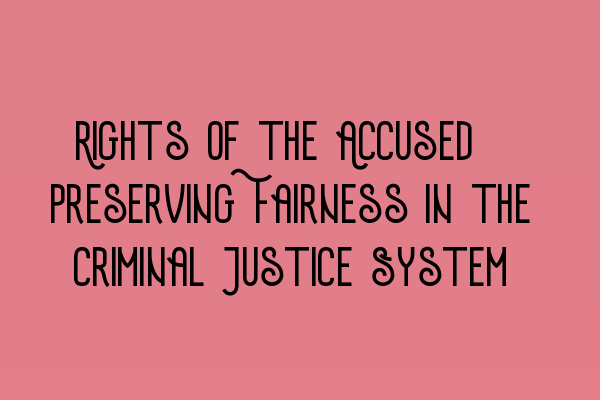Rights of the Accused: Preserving Fairness in the Criminal Justice System
The criminal justice system plays a crucial role in maintaining law and order in society. However, it is essential to ensure that the rights of the accused are protected to uphold fairness and integrity in the legal process. The accused, regardless of the nature of the crime they are charged with, are entitled to certain fundamental rights that safeguard their interests and prevent any potential miscarriage of justice.
Presumption of Innocence
One of the fundamental principles of criminal law is the presumption of innocence. It is the cornerstone of a fair trial and signifies that an accused person is considered innocent until proven guilty. This principle is vital to protect individuals from baseless accusations and wrongful convictions. The burden lies on the prosecution to prove the guilt of the accused beyond a reasonable doubt before they can be convicted.
Right to Legal Representation
The right to legal representation is a fundamental right that ensures the accused have access to competent legal advice and representation throughout the criminal proceedings. This right acts as a safeguard against unfair treatment and helps balance the power dynamics between the accused and the prosecution. Engaging a skilled criminal defense solicitor can significantly impact the outcome of a case, especially when it comes to presenting a strong defense and challenging the evidence brought forth by the prosecution.
Right to a Fair and Public Hearing
Every accused individual has the right to a fair and public hearing. This right guarantees transparency and accountability in the criminal justice system. A fair and public hearing enables the accused to present their defense, question the evidence against them, and allows for impartial judgment by an independent court or jury. It also helps maintain public confidence in the legal system by ensuring that justice is served in an open and unbiased manner.
Right to Remain Silent
The right to remain silent is a crucial aspect of the rights of the accused. It protects individuals from self-incrimination and ensures that they are not forced to provide evidence against themselves. This right helps prevent coerced confessions and allows the accused to strategically decide when and how to present their case. It is a fundamental protection that promotes fairness and prevents abuse in the criminal justice system.
Right to Challenge Evidence
The accused have the right to challenge the evidence presented against them. This includes the right to cross-examine witnesses, present evidence in their defense, and challenge the admissibility of any evidence that may be obtained unlawfully or in violation of their rights. This right ensures that only reliable and legally obtained evidence is considered during the trial, thereby protecting the fairness and integrity of the criminal justice system.
Conclusion
Preserving fairness in the criminal justice system requires the protection of the rights of the accused. The principles of presumption of innocence, right to legal representation, fair and public hearing, right to remain silent, and the right to challenge evidence are essential to ensure that justice is upheld and the truth is discovered in a fair and transparent manner. As legal professionals, it is our duty to advocate for these rights and protect the interests of the accused throughout the criminal process.
To learn more about criminal law and prepare for the SQE exams, you may find the following articles helpful:
SQE 1 Practice Exam Questions,
SQE 1 Practice Mocks FLK1 FLK2,
SQE 2 Preparation Courses,
SQE 1 Preparation Courses, and
SRA SQE Exam Dates.
